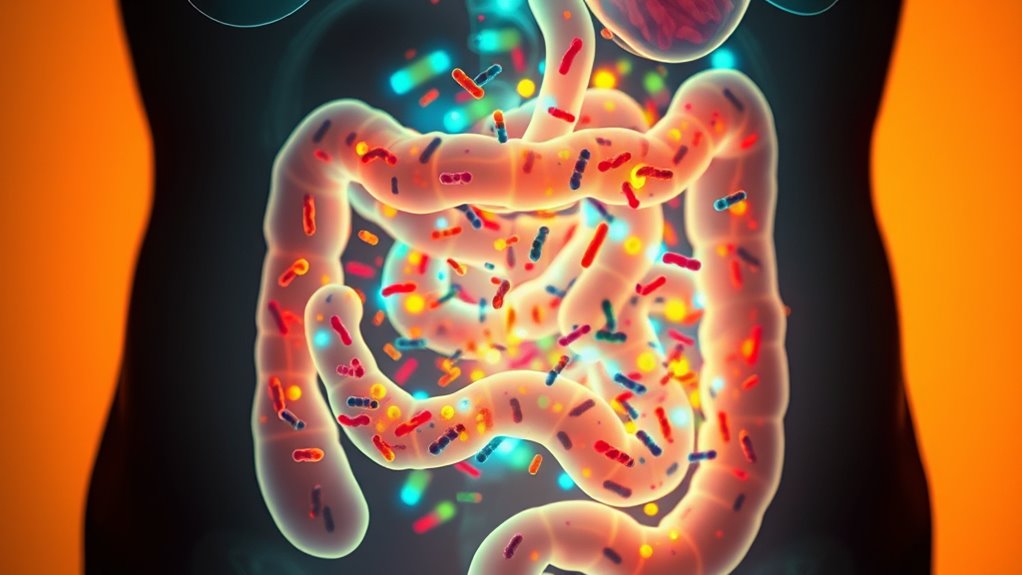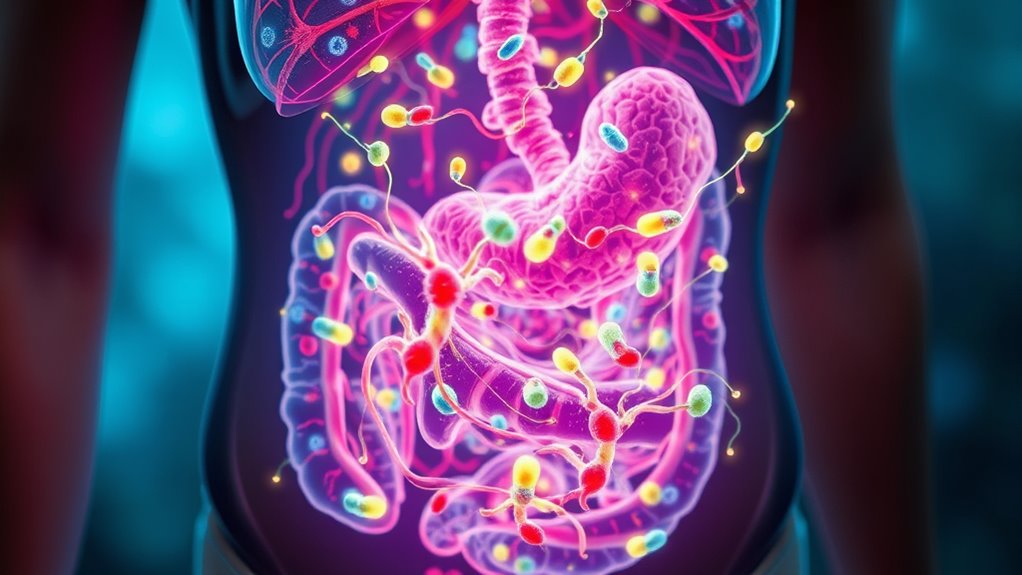Your gut microbiome affects your mood because it produces mood-related chemicals like serotonin and helps regulate inflammation. When your gut is healthy and diverse, it supports balanced neurotransmitter levels, leading to better emotional well-being. Conversely, an imbalanced microbiome might cause mood swings, anxiety, or depression. By maintaining a healthy gut through diet and lifestyle, you can boost your mental resilience. If you keep exploring, you’ll discover even more ways your gut impacts how you feel.
Key Takeaways
- The gut microbiome influences mood by producing neurotransmitters like serotonin, most of which are generated in the gut.
- A diverse and balanced microbiome supports emotional stability and reduces risks of anxiety and depression.
- Disrupted gut bacteria can decrease serotonin production and increase inflammation, negatively affecting mental health.
- Consuming fiber, fermented foods, and probiotics promotes microbiome diversity and mental well-being.
- The bidirectional gut-brain connection means gut health directly impacts mood and emotional resilience.

Have you ever trusted a gut feeling, only to find it was spot-on? That intuitive sense isn’t just some vague sensation; it’s rooted in your body’s complex communication system, especially the gut brain connection. Your gut isn’t just about digestion—it’s a hub of microbial diversity, teeming with trillions of bacteria that influence more than just your stomach. These microorganisms play a vital role in shaping your mood, stress levels, and overall mental health. When your microbial diversity is balanced and healthy, you’re more likely to experience a stable, positive mood. But if your gut microbiome is disrupted, your mental well-being can suffer, making you more prone to anxiety and depression.
The gut brain connection acts as a two-way street, linking your gut and brain through neural pathways, hormones, and immune signals. When your gut bacteria are thriving, they produce neurotransmitters like serotonin, which is often called the “happy chemical” because it considerably affects your mood. In fact, about 90% of your body’s serotonin is made in the gut. That means if your microbiome is imbalanced—say, due to poor diet, stress, or antibiotics—your serotonin production can dip, leading to feelings of irritability, sadness, or anxiety. You might not realize it, but your gut health directly influences your emotional state, and paying attention to it can be a game-changer. Maintaining microbial diversity is essential for a resilient gut-brain axis, as microbial diversity supports the production of key neurotransmitters and signaling molecules.
Supporting this diversity through the consumption of a varied diet rich in fiber, fermented foods, and probiotics can help sustain a robust microbiome. When your microbiome is healthy, it also helps regulate inflammation, which has been linked to mood disorders. Conversely, a less diverse microbiome can lead to increased inflammation and a higher risk of mental health issues. The connection between your microbes and your mood isn’t just theoretical; ongoing research continues to reveal how deeply intertwined your gut health and mental health are.
Frequently Asked Questions
Can Probiotics Improve Mental Health?
Probiotics can potentially improve your mental health by supporting your gut microbiome. Certain probiotic strains, like Lactobacillus and Bifidobacterium, may help reduce anxiety and improve mood. Incorporate these strains into your mental health strategies to boost your overall well-being. While probiotics aren’t a cure-all, they’re a promising addition that can complement other mental health approaches for a healthier mind and gut connection.
How Quickly Can Gut Health Affect Mood?
You might be surprised how quickly your gut health can influence your mood. The gut-brain connection suggests that within hours to days, improving your microbiome stability can positively impact your emotional state. When your microbiome is balanced, it sends clearer signals along the gut-brain axis, helping you feel calmer and more centered. So, don’t underestimate the power of fostering microbiome stability; it can start shaping your mood sooner than you think.
Are There Specific Foods That Boost Microbiome Balance?
You can boost your microbiome balance by eating fermented foods like yogurt, kimchi, and sauerkraut, which introduce beneficial probiotics. Additionally, focus on prebiotic-rich diets that include fiber-dense foods such as garlic, onions, bananas, and whole grains. These foods nourish your gut bacteria, helping maintain a healthy microbiome. Incorporating both fermented foods and prebiotics into your meals supports your gut health and, consequently, your mood.
Does Stress Impact Gut Bacteria Composition?
Stress can profoundly impact your gut bacteria composition through stress-induced dysbiosis. When you’re stressed, your body releases cortisol, which can disrupt the balance of beneficial microbes. This imbalance might lead to digestive issues and affect your mood. To protect your microbiome, manage stress through relaxation techniques, exercise, or mindfulness. Keeping cortisol levels in check helps maintain a healthy microbiome and supports your overall mental well-being.
Can Microbiome Testing Predict Mental Health Issues?
Think of your microbiome as a garden of diverse flowers. By testing its diversity, you get a glimpse into your mental health landscape. While microbiome testing can hint at potential issues, it’s more like a weather forecast than a crystal ball. It can help predict mental health trends, but you still need to nurture your garden with healthy habits. So, yes, it offers valuable clues but isn’t a definitive prediction.
Conclusion
So, isn’t it funny how your gut might just be quietly whispering about your mood? That coincidence of a balanced microbiome often aligns with feeling more upbeat and calm. The next time you notice a gut feeling, remember it’s not just in your head—your gut could be guiding your happiness too. Trust that tiny universe inside you; nurturing it might be the secret to a better mood, without even realizing it.









